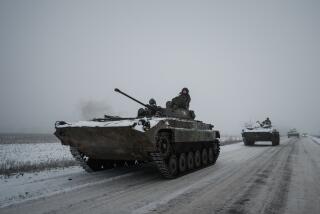U.S. General Urges West to Do More in Balkans : Allies: But NATO commander stops short of advocating massive intervention by ground troops.
- Share via
WASHINGTON — The U.S. commander of allied troops in Europe said Monday that America and its allies should do more to help ease the situation in Bosnia-Herzegovina, but he stopped short of advocating intervention by huge numbers of ground troops.
Gen. John M. Shalikashvili suggested that the West use its troops to help enforce the arms embargo against Serbia and to help rebuild and deliver aid to Bosnia.
He also suggested that a punitive air strike on Serbia might have “some value” in deterring aggressive Serbian moves into Kosovo--a Serbian province where most of the population is ethnic Albanian--and laying down a “marker that, if the Serbs move in an aggressive way into Kosovo . . . the West is prepared to punish such action.”
Sending such a signal is crucial, said Shalikashvili, supreme commander of North Atlantic Treaty Organization forces in Europe, because if the fighting spreads to Kosovo it could escalate the Bosnian crisis from a “human tragedy” into a “nightmare scenario” in which neighboring countries would be drawn into the combat.
His suggestions in an interview with The Times appeared to provide a road map for the incoming Clinton Administration to step up American help in Bosnia. But all his proposals would limit American troop involvement--a factor certain to make them more palatable to senior U.S. military leaders such as Gen Colin L. Powell, chairman of the Joint Chiefs of Staff.
Shalikashvili’s views are expected to be among the most important the new Administration will receive on the issue, since the general is both NATO’s senior military officer and commander of the U.S. forces that would be used in such a conflict.
President Bush has been reluctant to commit American ground troops to the area, for fear of becoming bogged down in a Vietnam-style “quagmire” in mountainous Bosnia. But President-elect Bill Clinton has advocated stronger U.S. action in the area--to the consternation of some military authorities who share Bush’s apprehension about launching ground operations there.
While the Bush Administration has pressed for greater enforcement of a Bosnian “no-fly zone,” it has resisted entreaties to use American troops to expand humanitarian aid or to shut off the flow of arms to Serb-backed forces.
Shalikashvili’s comments on Kosovo, and his conviction that it would be disastrous to permit fighting to spread there, have been echoed by some Bush Administration officials.
He also said that Washington’s European allies are losing patience with Serbia and have eased their reluctance to enforce a Bosnian no-fly zone. France and Britain have argued that, if the Western allies send combat aircraft to clear Bosnian skies, their troops operating in the area under the U.N. flag might face reprisals from Serbs.
“My sense is that the nations by and large--including the nations that have soldiers on the ground--have come around to the view that if the peace effort now ongoing in Geneva breaks down, then it is important that we proceed with the enforcement of such a no-fly regime, even if we make the provision of humanitarian aid on the ground more difficult,” Shalikashvili said.
The general, appointed NATO commander last June, maintained that enforcement of a no-fly zone is “not terribly important” from a military point of view. There have been few Serbian flights, he said, and those that have occurred have not contributed significantly to the Bosnian “carnage.”
But stiff international enforcement of the no-fly zone would deliver to Serbia an important message of international resolve, he said.
Shalikashvili declined to say how many troops would be needed to bolster enforcement of an arms blockade, help rebuild the Bosnian infrastructure or to step up delivery of humanitarian aid.
Times staff writer Art Pine in Washington contributed to this article.
More to Read
Sign up for Essential California
The most important California stories and recommendations in your inbox every morning.
You may occasionally receive promotional content from the Los Angeles Times.











